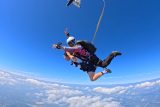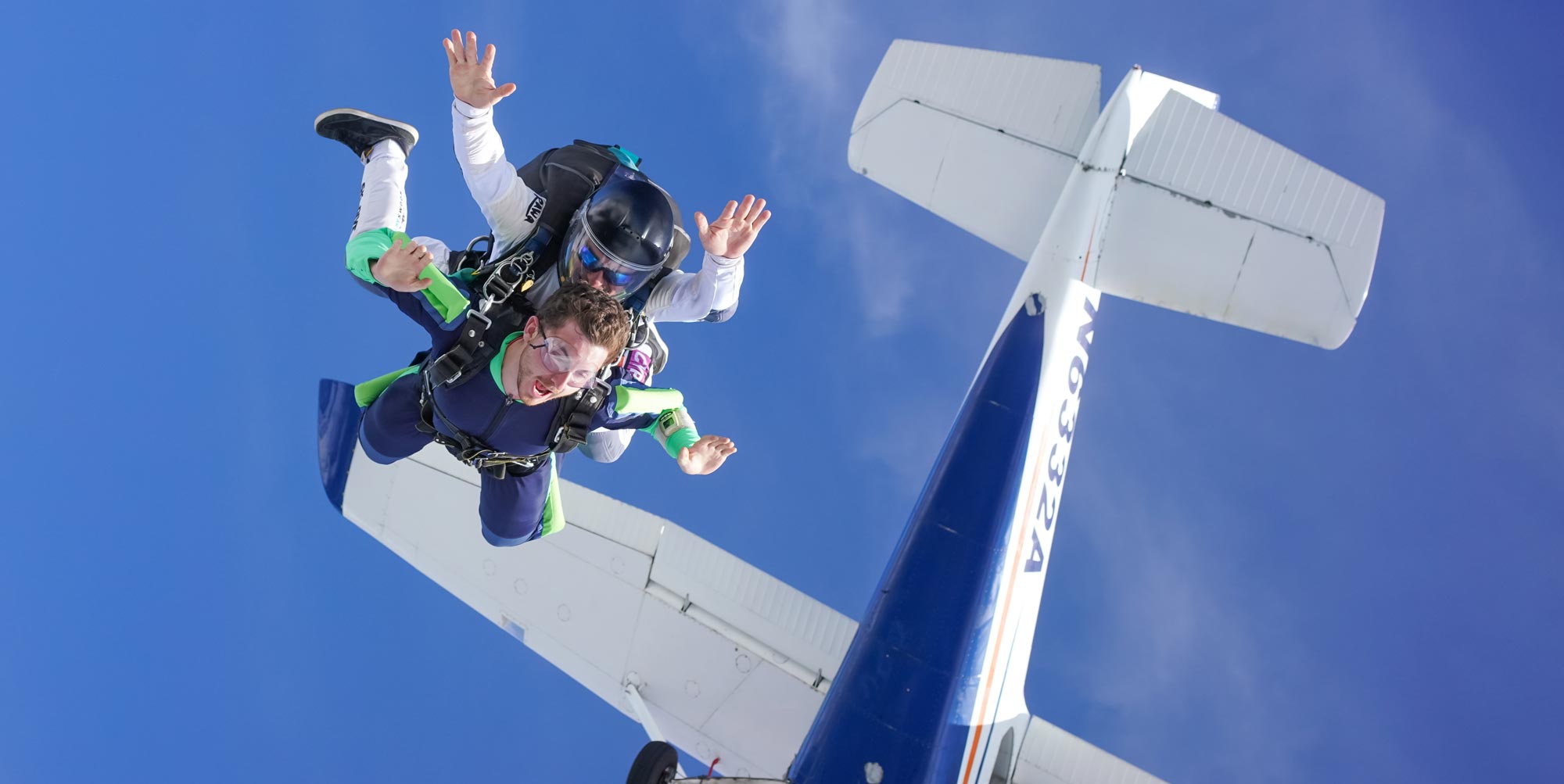Can You Skydive With Asthma?
General
Posted by: Long Island Skydiving Center 6 months ago
There’s a lot to think about before going skydiving for the first time, and adding a medical condition to the list can certainly make the prospect of jumping out of an airplane more daunting.
If you have asthma, skydiving might seem like it’s off the bucket list for you. So, can you skydive with asthma? Yes, it’s entirely possible to skydive with asthma as long as it’s under control! Having said that, there are a few things to consider before signing up to launch yourself out of an airplane, including getting the opinion of a medical professional first.
Read on to learn about everything you need to know to answer the question: can you skydive if you have asthma.
Understanding Asthma & Physical Activity
Our lungs are made up of a network of increasingly smaller tubes that hold air and transfer oxygen into our bloodstream. Any type of blockage or restriction in these airways impact breathing and can even lead to a life threatening emergency.
Asthma is one of the common respiratory conditions that can cause mucus buildup or airway constriction in the lungs and make it extremely difficult to inhale and exhale. Experiencing an asthma attack while participating in physical activity can be scary and dangerous.
That’s why it’s important to take proper precautions and keep yourself safe if you are planning on engaging in adventurous activities, like skydiving, if you’re someone with asthma.
There’s currently no cure for asthma, but its symptoms can be managed with treatment and care. So don’t worry! As long as your asthma is under control, chances are you can still take part in amazing experiences like skydiving.
Breathing While Skydiving
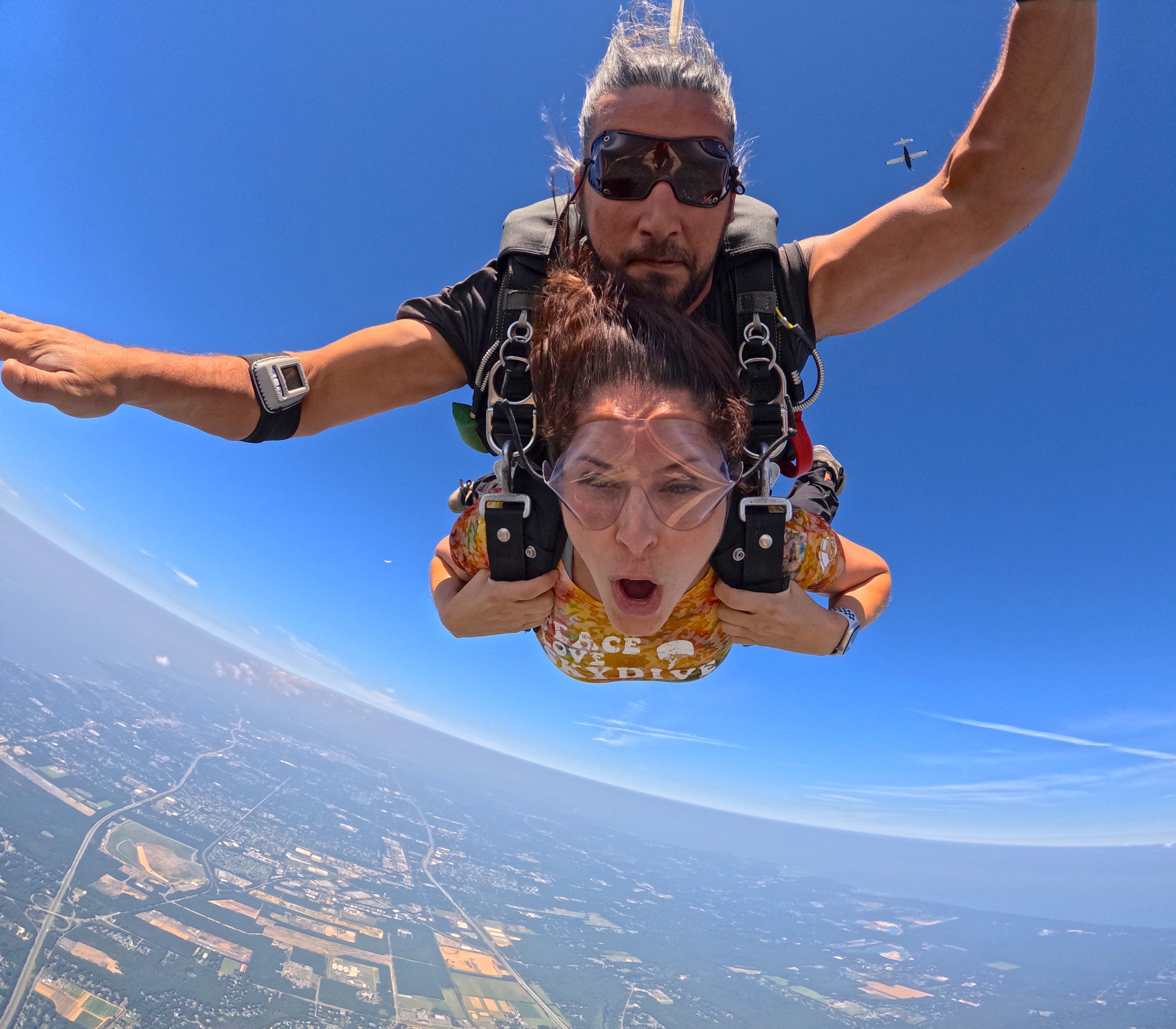
Breathing is an incredibly important aspect of jumping out of airplanes. We know what you’re thinking — isn’t breathing always important? Well yes, of course it is, but controlling your breathing during your skydive will help you keep your emotions in check and your mind focused on the task at hand.
It’s natural for our breathing rate to increase during high stress activities like plummeting toward the ground at 120 mph. Heightened heart rate and hyperventilation are two of our body’s main stress responses to prepare us for fight or flight in the face of perceived danger. That’s why overcoming our brain’s urge to flip the switch by taking slow, measured breaths is so important.
Maintaining a regular breathing rate while in freefall will keep all of your other physiological processes out of the fever-pitch they’re pushing toward and will allow you to be truly present in the moment. It takes a lot to get up the courage to jump out of a plane, you don’t want to miss the best part because you lost your nerve at the last second!
It can also sometimes feel difficult to catch your breath during freefall due to the high wind passing over your nose and mouth. Imagine what it would feel like to stick your head out the car window while driving down the highway. Now double it. That force of wind can definitely take your breath away, not to mention the very unfamiliar feeling of flying through the air.
Focusing on pushing air out of your lungs (aka SCREAMING!) will ensure that your body will naturally pull more air in again, and that your breathing cycle will continue uninterrupted.
Skydiving Precautions for Asthma
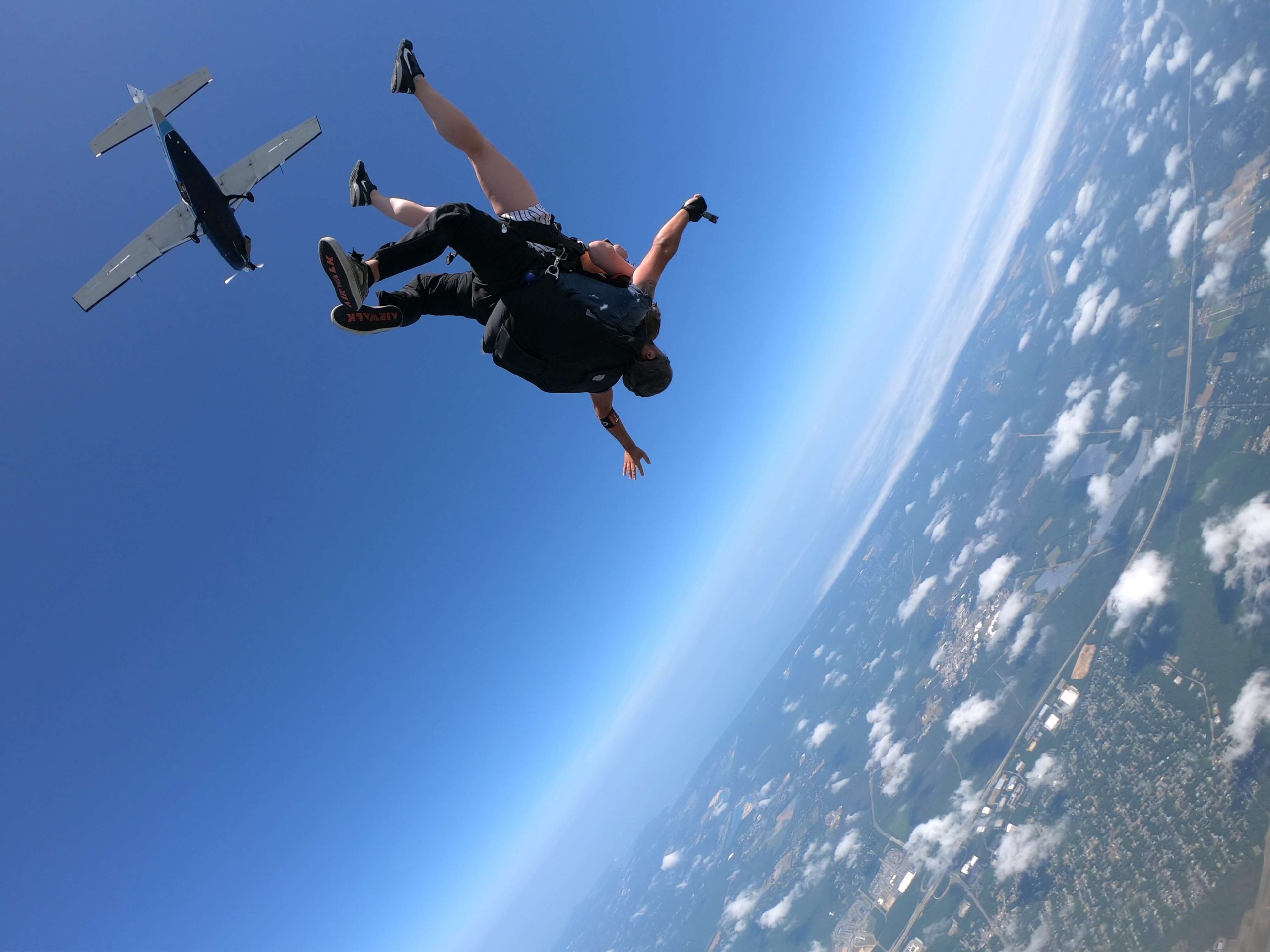
With all of this in mind, it’s understandable that you may feel hesitant to skydive with asthma. Experiencing an asthma attack on the ground is nothing anyone wants to go through, let alone having one a few miles above the Earth.
The good news is: there are lots of people with asthma who skydive! The important part is knowing your body and listening to it. It can be tempting to push yourself outside of your comfort zone, especially to do something as limit-testing as skydiving. It’s hard to turn down an incredible adventure. But if you’re feeling off or worried that you’re on the cusp of an attack, it’s best to sit this one out.
That doesn’t mean you can’t ever skydive, you might just need to reschedule and try again. The main thing is keeping yourself safe and enjoying your skydive, and listening to your body will help you do just that.
You can also talk to your instructor about bringing any inhalers or medication you have with you on the jump. Of course, you won’t be able to use them during the actual skydive, but having access to it in the airplane might save you before you exit. And having it at the ready as soon as you land means you’ll only have to go about 10 minutes without it.
Skydiving is all about being prepared, and having asthma just adds one more consideration to the list.
Choosing the Right Conditions
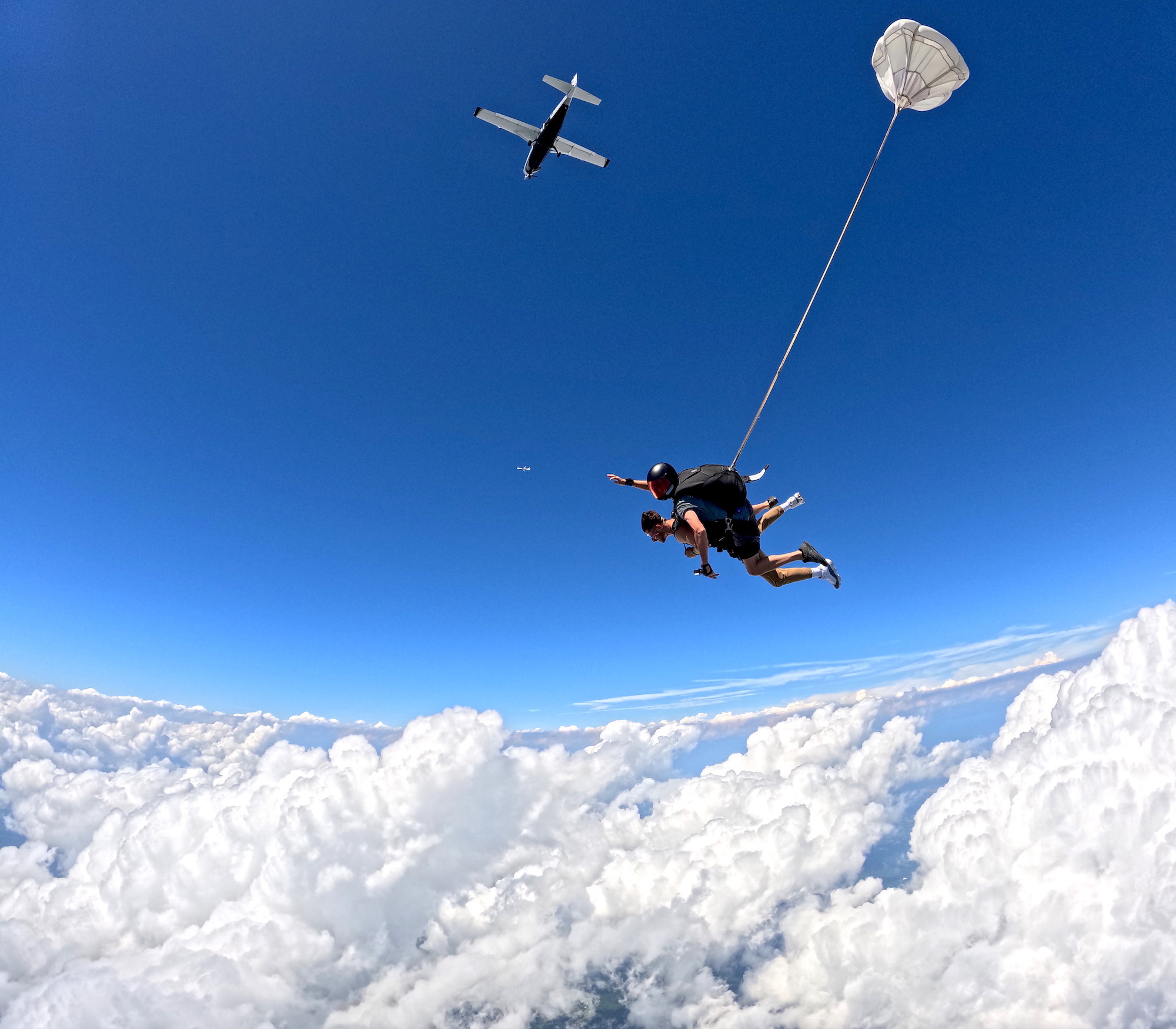
Believe it or not, certain weather conditions can actually make asthma attacks more likely. Cold, dry air, which is common at skydiving altitude, can more easily trigger asthma attacks, as well as extreme humidity.
Skydivers are no stranger to obsessing over weather, so adding an extra consideration for asthma is really no big deal. Here at Long Island Skydiving Center, we prioritize safety and would rather jump when the time is right than push it just to get in the air. This should be one of the best moments of your life, and an asthma attack mid-air is NOT it.
You know your body best, and you’ve probably been managing your asthma for a long time. You know your triggers and risks, so let us know if something doesn’t feel right. Talk it through with your instructor and make the decision that’s going to keep you safe. Skydiving will be here another day, and we want you to be around for it.
Extremes are what make skydiving so much fun, but, at least when it comes to weather, aim for the time of year that’s most mild.
Medical Clearance & Professional Advice
Perhaps the most important part of skydiving with asthma is securing medical clearance from a doctor. We are professionals at what we do, but that’s not asthma treatment. It’s best to consult a medical professional before booking your skydive if you have asthma or any medical condition that you worry could impact your safety during your jump.
Even if you know you’ll be okay to skydive, your doctor may have some tips and advice to calm your nerves and help you enjoy your skydiving experience even more.
Want to see what it feels like to breathe the air thousands of feet up? Book a jump with us today! Blue skies!


